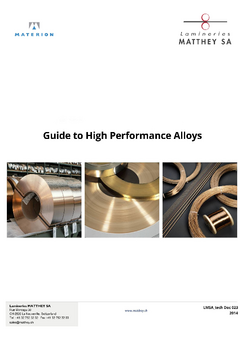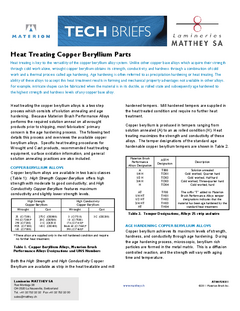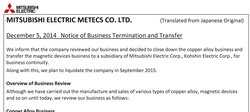Copper and low-alloyed copper
Without any special arrangements, the melting process of copper results in the release of small quantities of oxygen in the liquid metal which would otherwise have negative effects on certain applications. The oxygen present in the solid solution forms intermetallic compounds with certain impurities and thereby reduces the negative effects on the electrical conductivity. However, through the presence of oxygen, copper is not suitable for processes with temperatures above 300°. Lamineries MATTHEY offer two copper standard variants:
- Cu-ETP with a copper content of over 99,90 % and a conductivity in soft-annealed condition at 100 % IACS (International Annealed Copper Standard), the oxygen content is between 200 and 400 ppm.
- Cu-OF with a copper content of over 99,95 % and conductivity of over 100 % IACS. This copper differs from Cu-ETP by the non-existence of oxygen.
The importance of low alloyed copper is based on the fact that by adding small amounts of certain elements, the mechanical properties or the thermal stability is increased without affecting the electrical conductivity. These alloys include:
- Copper, iron and phosphor alloys. There are different compositions available on the market, e.g. CuFe2.5P which is hardened through intermetallic compounds such as Fe2P. These alloys combine good mechanical properties with high electrical conductivity.
- Copper, nickel and silicon alloys. Various chemical compositions (CuNi2Si, CuNi3Si etc.) are on the market. The hardness of these alloys increases by the occurrence of intermetallic nickel-silicon particles (e.g. type Ni2Si). The solubility of these particles in the copper matrix is low, but not insignificant at low temperatures and has, similar to silicon in solid solution, rather negative effects on the electrical conductivity of the copper, which, for this type of alloy, rarely exceeds 45 % IACS (International Annealed Copper Standard). Mechanical strength and thermal stress relaxation resistance are higher than those of CuFeP.
Lamineries MATTHEY offer, in partnership with KM Europa Metal AGhttp://www.kme.com/en/industrialrolled-highperformancealloys, a wide range of copper alloys, like STOL® 78, STOL® 76M, STOL® 94, etc. supplied as thin precision precision strips and foils, used in varied applications such as watch and clock making, connector technology, membrane production etc.
Copper and low-alloyed copper
| Description | Technical file |
| Cu-ETP - E Cu 58 / Cu a1 (Cu99) / CW004A / C11000 |  Cu-ETP_22E.pdf Cu-ETP_22E.pdf |
| Cu-OF - OF-Cu / Cu c1 / CW008A / C10200 |  Cu-OF_v22E.pdf Cu-OF_v22E.pdf |
| Cu-OFE - OFE-Cu / C10100 |  Cu-OFE_v22E.pdf Cu-OFE_v22E.pdf |
| STOL® 194 - CuFe2.5P / C19400 | |
| STOL® 76 - CuNi1.3Si0.25 / C19010 |  Stol76_v22E.pdf Stol76_v22E.pdf |
| STOL® 76M - CuNi1.3Si0.25 / C19002 |  Stol76M_v22E.pdf Stol76M_v22E.pdf |
| STOL® 78 - CuMg0.6 / C18665 |  Stol78_v22E.pdf Stol78_v22E.pdf |
| STOL® 79 - CuFe2.5P / CW107C / C19400 | |
| STOL® 94 - CuNi2.6Si0.6Zn0.8Sn0.4 / C70310 |






